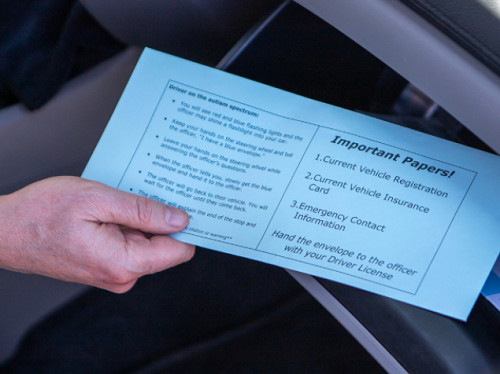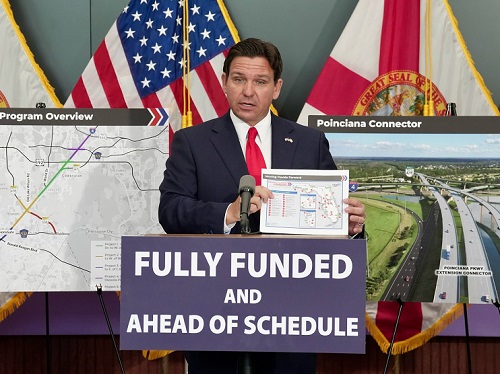Governor Ron DeSantis (R) (above) and the Florida Department of Transportation recently unveiled expedited construction timelines for several “Moving Florida Forward” infrastructure projects, including the widening of I-4 in Osceola and Polk counties and the Poinciana Parkway Connector Project in Osceola County.
[Above photo by Florida Governor’s Office]
Construction on those projects will take place in stages, the Florida DOT said; widening 14.7 miles of I-4 in Osceola and Polk counties from six to 10 lanes, which includes express lanes to help reduce roadway congestion.

That collection of I-4 projects – which should start in the fall of 2024 – also seek to widen all road shoulders for emergency evacuations and rework interchanges to reduce backups and queuing along ramps.
An additional project – the Poinciana Parkway Connector project – aims to fill a critical 2.6-mile roadway through a heavily traveled portion of Osceola County, connecting I-4, SR 429/Western Beltway, and the existing SR 538/Poinciana Parkway.
Previously expected to begin 2034 at the earliest, the Poinciana Parkway Connector project will now start in the fall of 2024 and should wrap up by 2028, Florida DOT said.
The funding to kick start those projects earlier than planned comes from House Bill 1301. Passed by the state legislature this year session, it provides Florida DOT with the authority to complete the “Moving Florida Forward” infrastructure initiative.
Additionally, the bill cements Florida’s transportation priorities in state law to focus on reducing congestion, supporting the supply chain, promoting Florida’s quality of life, and spending transportation dollars wisely, noted Florida DOT Secretary Jared Perdue.
“[These] ‘Moving Florida Forward’ projects along I-4 will provide a tremendous number of improvements for nearly 200,000 travelers who have been anxiously waiting for congestion relief as commuter, tourist, and freight traffic grows in Central Florida,” he said in a statement.

Perdue delved further into those and other transportation trends and how they are affecting future infrastructure planning efforts during a panel discussion at the American Association of State Highway and Transportation Officials 2024 Washington Briefing in February.
“We are dealing with some of the most significant changes as state departments of transportation, irrespective of federal legislation,” he said. “We are facing supply chain disruptions we’ve never dealt with before. The cost of commodities has been extremely volatile over the last three years. All of that places additional strain and pressure on our traditional ways of doing business.”
Successfully dealing with all of those external challenges will require state DOTs to be more innovative and to build partnerships with both local communities and Metropolitan Planning Organizations or MPOs, Perdue added.
“We need to focus on funding levels to sustain infrastructure levels in this country yet maintain flexibility so we can still deliver the transportation infrastructure we’ve already planned for,” he said. “We need less regulation. Yes, we need to serve our constituents and do what we have to do to protect the environment. But it is time to go back and look at the processes we’ve been using – they are antiquated, dinosaurs at this point. We need more flexibility so we can be more innovative.”
 States
States
Arizona DOT Launches ID Program for Autistic Motorists
April 26, 2024 States
States

